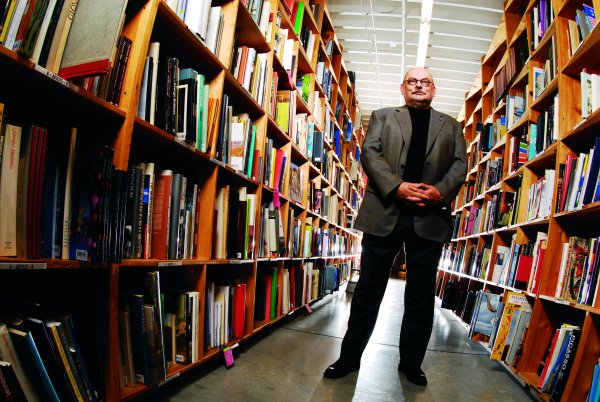 Even before stock markets plunged and banks went bust, independent bookstores were closing their doors for good. But not Powell’s Books.
Even before stock markets plunged and banks went bust, independent bookstores were closing their doors for good. But not Powell’s Books.
 MICHAEL POWELL MICHAEL POWELLPresident and owner of Powell’s Books POWELL’S BOOKS, powells.com FOUNDED: 1971, Portland EMPLOYEES: 520 BOOKS SOLD ANNUALLY: 4.5 million NUMBER OF DAILY VISITORS TO THE FLAGSHIP STORE: 3,000-6,000 PHOTO BY ANTHONY PIDGEON |
Even before stock markets plunged and banks went bust, independent bookstores were closing their doors for good. But not Powell’s Books. “When people talk about the book business, there’s everyone else and then there’s us,” says 68-year-old Michael Powell, president and owner of the largest independent bookstore in the world. “We’re in our own category.”
Powell’s Books stands out not only for the size of its flagship store — the 68,000-square-foot building in Portland’s Pearl District attracts somewhere between 3,000 and 6,000 visitors a day — but its age. Powell’s father, Walter, opened the Portland store in 1971. Michael bought the store from him 10 years later.
Powell’s has survived the rise of bookstore behemoths Barnes & Noble and Borders as well as the emergence of online bookselling. Today the company consists of six Oregon stores and the website Powells.com, which sells the entire stock of books and accounts for 30% of annual sales.
As the economy withers and the publishing industry struggles to push the printed word, the bookstore has been forced to re-examine operations. Poised in “a good, competitive, strategic position,” according to Powell, the company hasn’t made any drastic changes, but did cancel plans to remodel the main store and asked employees to voluntarily cut down on hours or take sabbaticals to avoid making layoffs.
To help generate revenue, the company has revived a formative focus on buying and selling used books. In the early days, Walter Powell made the unorthodox decision to shelve new and used books side by side. The strategy propelled the sale of used books, which have a higher profit margin than new books.
The Pearl District store alone bought an average of 4,000 used books a day last year, but new has outsold used by 60% to 40%, a shift Powell attributes to online competition. The company hopes to return to selling 50% new and 50% used books in 2009, using the tool that’s shifted the balance. It recently launched an online system that rewards individual sellers with instant cash for their books using online banking systems such as PayPal. The system tracks needed titles using algorithms, preventing surplus, and has already increased the stock of profitable recent titles, Powell says.
Even though creating and using new technologies can cost more upfront, Powell recognizes the need to remain current. “We want to keep our hands in new technologies so we’re prepared for new opportunities,” he says. “It’s important to stay relevant.”
For example, Powell’s now sells eBooks for four electronic devices, the antithesis of shelves of dog-eared used books. Even though eBooks accounted for just 3% of sales last year, the offering represents the president’s drive to keep the company nimble and fluid, ready to respond to new demands.
The same sense of adaptability prompted the bookstore to start selling through Amazon.com, the web’s largest bookseller. “My ego isn’t so big that I can’t see the benefit of partnering with a competitor,” says Powell.
Next July, Powell will turn over company operations to his 30-year-old-daughter, Emily, the current VP, who recently received a degree from the Berkley-Columbia Executive MBA program and has held positions in marketing, online sales and used books. In terms of the economy, timing may not be ideal, but father, daughter and company have been preparing for the transition for years.
While Powell expresses some worry about the future, during the current economy and beyond, 30 years of experience, which includes starting a retail business in a dilapidated warehouse district, has created confidence.
“If we’re surrounded by vacant storefronts it’s going to affect us,” he says. “But we started out surrounded by vacant storefronts, and we survived that.”
LUCY BURNINGHAM
Have an opinion? E-mail [email protected]



